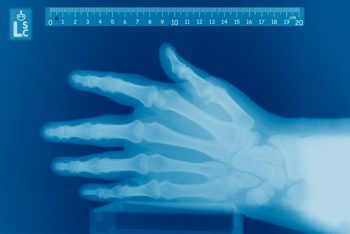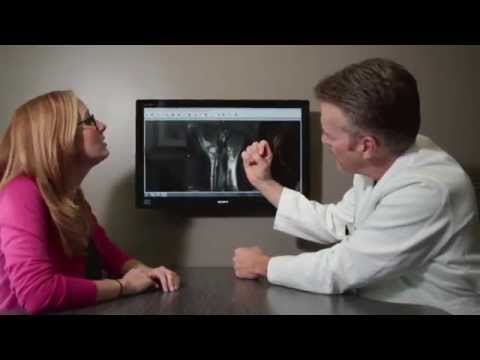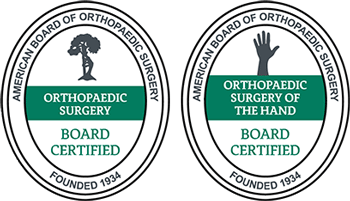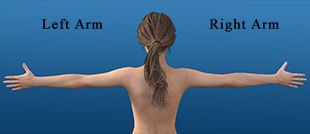5 Potential Causes of Stiff Hands

“Hand X-ray one.” By Sarah Cartwright licensed under CC BY-SA 2.0
We all use our hands every day for nearly everything that we do. When your hands start becoming stiff, it can prevent you from performing your daily routine and doing what you love. If you’re experiencing stiffness in your hands, there can be several causes. Learning about five potential causes of stiff hands can hopefully help you find an answer for relief.
Contents
Hand Stiffness
The hand comprises 27 bones, 34 muscles, 27 joints, and over 100 ligaments and tendons. Since we use our hands so much and they’re so intricate, even delicate, hand injuries can be relatively common. Whether you’re suffering from overuse or arthritis, have taken a fall, or have an infection, many different conditions can lead to hand stiffness. These conditions can sometimes be treated at home with time, though others require medical intervention to heal properly.
Arthritis
One of the top causes of hand stiffness is arthritis. There are four kinds of arthritis, including:
- Osteoarthritis: This type of arthritis is also known as degenerative joint disease or wear and tear arthritis. Symptoms of osteoarthritis may start as dull and intermittent and progressively get worse. You may also experience stiffness, reduced range of motion, swelling, and difficulty gripping or pinching items.
- Rheumatoid arthritis (RA): RA is an autoimmune condition that causes joint inflammation, pain, and possibly changes to the shape of the hands. You may also experience stiffness, especially in the morning, and loss of strength.
- Psoriatic arthritis: This type is another autoimmune condition that also has skin symptoms, such as psoriasis. With psoriatic arthritis, you may experience stiffness, reduced movement, discomfort, and inflammation.
- Gout: Gout can become swollen, red, and sore, resulting in hand stiffness. Gout occurs when your body doesn’t get rid of enough uric acid, forming painful crystals.
Fractures of The Hand
A fracture may be more commonly known as a broken bone or, in this case, a hand fracture. If you fracture one of the bones in your hand, you could suffer from some stiffness. The hand comprises many bones, and each piece plays a part in your wrist and hand movements.
If enough pressure is applied to break the bone, the bone may become displaced. Hand fractures can also cause pain and decreased movement. Some will even create a deformity. Residual stiffness may occur since a fracture can affect the surrounding tendons and ligaments.
Dislocations of The Upper Extremity
Before and after a dislocation injury of the upper extremity, you may feel stiffness in the hand. The feeling can be similar to that of a broken bone or fracture. These injuries are relatively common and can significantly impact your range of motion. Often, a dislocation occurs with or is associated with fractures that occur simultaneously. Some common upper extremity dislocations include carpal dislocations, interphalangeal joint dislocation, shoulder dislocation, and elbow dislocation.
Finger Sprains
Spraining your finger can prevent you from using your hand and your ability to perform certain daily tasks. These types of injuries can cause stiffness, swelling, and severe pain. These injuries are commonly caused by sports injuries, car accidents, falls, and other impacts. A finger sprain can often be treated at home with time, but it’s a good idea to seek medical care if your symptoms persist or worsen.
Injuries to Tendons or Muscles
Tendons are the part of the hand that allows us to move freely. That’s why an injury to the tendon can cause hand stiffness or even more severe problems, such as the inability to move the hand. Various injuries can occur within the tendons and muscles of the hand or wrist. If your flexor tendons have been damaged, you may be unable to bend one or more of your fingers. Common causes of tendon or muscle injuries include cuts to your hand, sports injuries, animal bites, and crushing injuries.
Treatment for Stiff Hands
Your treatment at The Hand and Wrist Institute will depend on what is causing your symptoms, overall health, age, and severity. Please don’t hesitate to contact our office to schedule an evaluation with Dr. Knight. He will order any necessary testing and imaging to assess your condition and thoroughly provide you with a resolution.
When possible, more conservative treatments will be offered, including treating your injuries, offering medication for arthritis, or exercise therapy. If conservative treatment options don’t help alleviate your symptoms or your condition may only be helped by more invasive treatments, surgery may be required.
Exercises to Try
After ruling out an injury such as a fracture through a visit to your doctor, you can ask about hand exercises to alleviate your hand stiffness. Exercises can include:
- Ball pinch/squeeze: Find a squishy ball to pinch or squeeze lightly to help build strength and stretch your hand muscles.
- Make a fist: Tighten and loosen your hand by making a fist to help stretch your hand.
- Finger slides or touches: Use your fingers to slide and touch designated spots to stretch your finger muscles.
- Flex and bend your hand: Take time to stretch your hand and fingers by flexing and bending them gently.
Reach Out to The Hand and Wrist Institute Today
If you’re experiencing stiff hands, pain, or other symptoms of the aforementioned conditions, please don’t hesitate to contact our team. Our facility is a premier care center for hand and wrist conditions. Our staff is always updated on the latest technology and knowledge of conditions affecting these areas. Dr. Knight at The Hand and Wrist Institute cares about your care and will work hard to resolve your problem and develop appropriate treatment.
You can reach us at 855-558-4263 for any questions, or skip the phone call and schedule your appointment online. We offer offices in Southlake and Dallas for your convenience. Contact us today to get on the path to healing your hand stiffness.

























